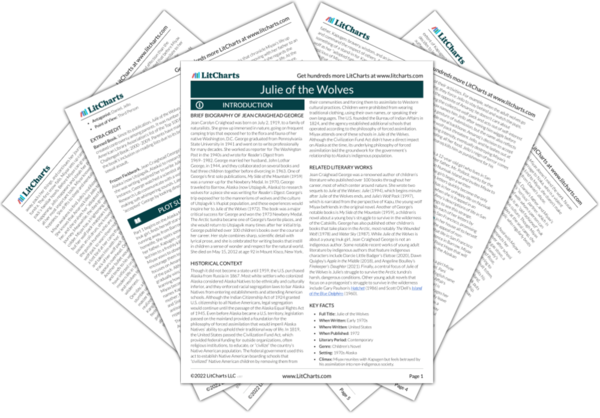Gussak Quotes in Julie of the Wolves
Here she was, watching wolves—she, Miyax, daughter of Kapugen, adopted child of Martha, citizen of the United States, pupil at the Bureau of Indian Affairs School in Barrow, Alaska, and thirteen-year-old wife of the boy Daniel. She shivered at the thought of Daniel, for it was he who had driven her to this fate. She had run away from him exactly seven sleeps ago, and because of this she had one more title by gussak standards—the child divorcée.
Amaroq got to his feet, and as he slowly arose he seemed to fill the sky and blot out the sun. He was enormous. He could swallow her without even chewing. “But he won’t,” she reminded herself. “Wolves do not eat people. That’s gussak talk. Kapugen said wolves are gentle brothers.”
He must indeed be their leader for he was clearly the wealthy wolf; that is, wealthy as she had known the meaning of the word on Nunivak Island. There the old Eskimo hunters she had known in her childhood thought the riches of life were intelligence, fearlessness, and love. A man with these gifts was rich and was a great spirit who was admired in the same way that the gussaks admired a man with money and goods.
“Change your ways when fear seizes,” he had said, “for it usually means you are doing something wrong.”
“Wolves are brotherly,” he said. “They love each other, and if you learn to speak to them, they will love you too.”
“Yes, you are Eskimo,” he had said. “And never forget it. We live as no other people can, for we truly understand the earth.”
As the months passed, the letters from Amy became the most important thing in Julie’s life and the house in San Francisco grew more real than the house in Barrow. She knew each flower on the hill where Amy’s house stood, each brick in the wall around the garden, and each tall blowing tree. She also knew the curls in the wrought-iron gate, and how many steps led up to the big front door; she could almost see the black-and-white tile on the floor of the foyer. If she closed her eyes she could imagine the arched doorway, the Persian rug on the living-room floor, the yellow chairs and the huge window that looked over the bay. Radios, lamps, coffee tables—all these she could see. And if she shut her eyes tight, she could feel Amy’s hand in her hand and hear Amy’s big feet tap the sidewalk. The second floor was always fun to dream about. At the top of the winding stairs four doors opened upon rooms lit with sunshine. And one was the pink room, the one that would be hers when she got to San Francisco.
The gussaks were paid to shoot them. A man who brought in the left ear of a wolf to the warden was rewarded with a bounty of fifty dollars. The bounty was evil to the old men at seal camp, for it encouraged killing for money, rather than need. Kapugen considered the bounty the gussaks’ way of deciding that the amaroqs could not live on this earth anymore. “And no men have that right,” he would say. “When the wolves are gone there will be too many caribou grazing the grass and the lemmings will starve. Without the lemmings the foxes and birds and weasels will die. Their passing will end smaller lives upon which even man depends, whether he knows it or not, and the top of the world will pass into silence.”
When she thought of San Francisco, she thought about the airplane and the fire and blood and the flashes and death. When she took out her needle and sewed, she thought about peace and Amaroq.
Julie pointed her boots toward Kapugen.












